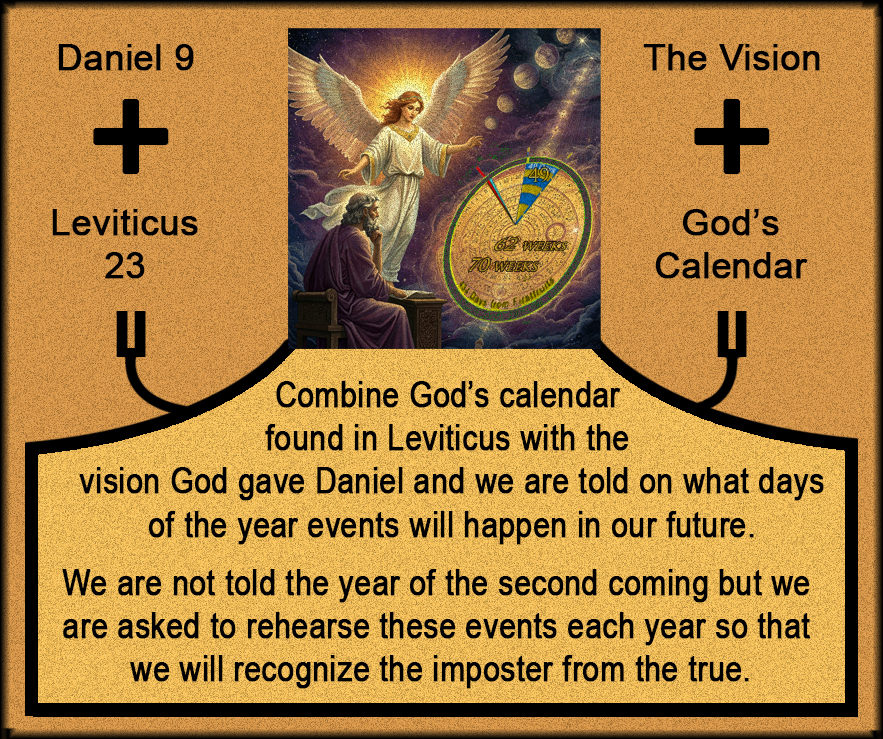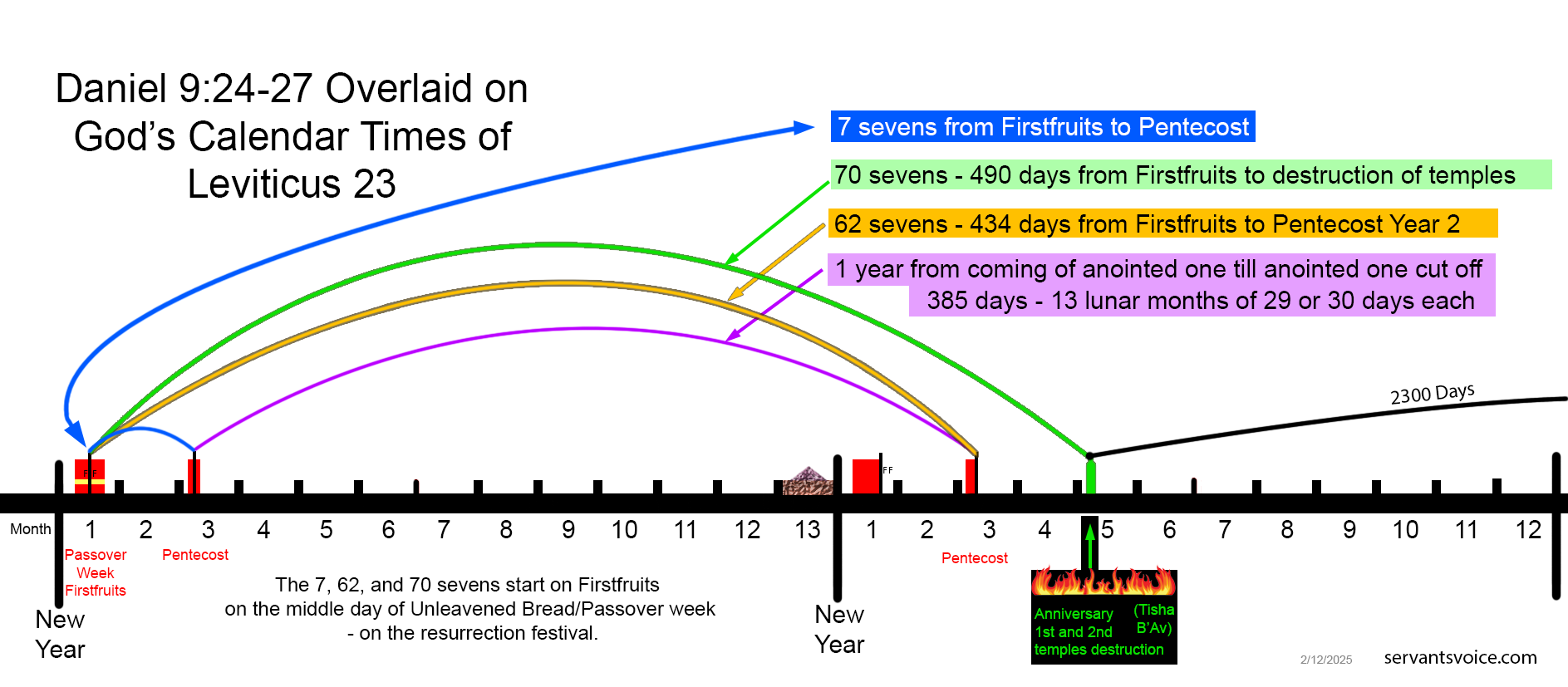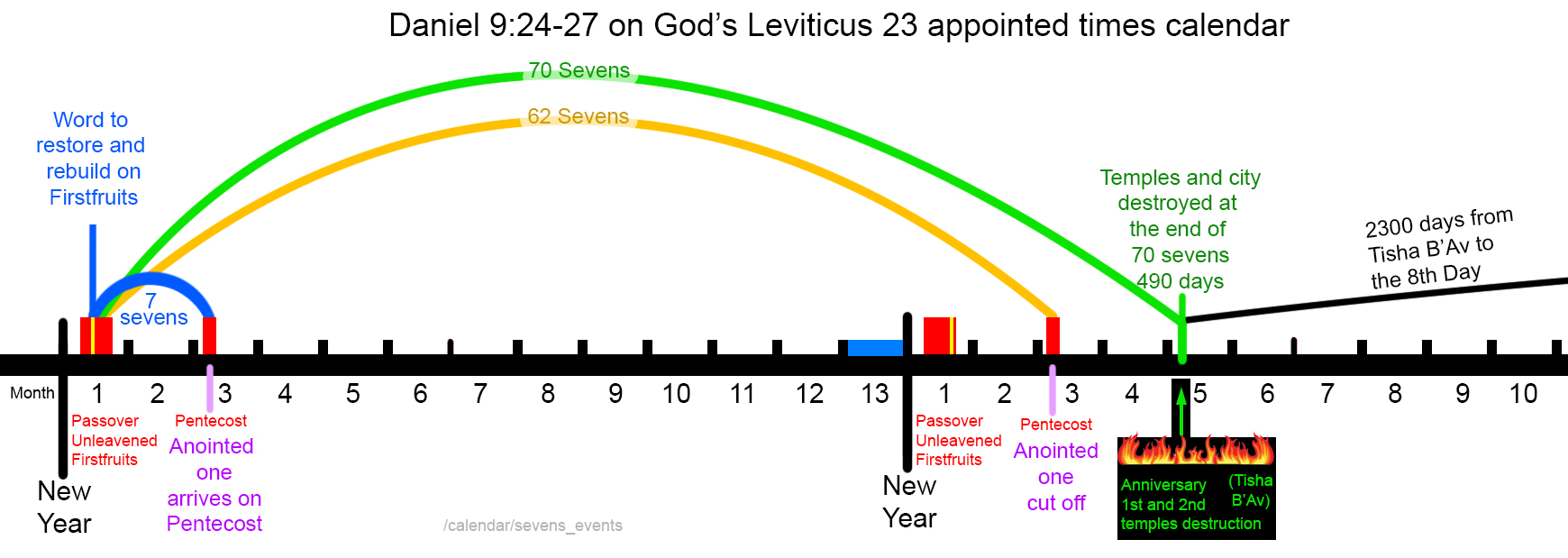Daniel 9:24-27 NET “Seventy weeks have been determined concerning your people and your holy city to put an end to rebellion, to bring sin to completion, to atone for iniquity, to bring in perpetual righteousness, to seal up the prophetic vision, and to anoint a most holy place. (25) So know and understand: From the issuing of the command to restore and rebuild Jerusalem until an anointed one, a prince arrives, there will be a period of seven weeks and sixty-two weeks. It will again be built, with plaza and moat, but in distressful times. (26) Now after the sixty-two weeks, an anointed one will be cut off and have nothing. As for the city and the sanctuary, the people of the coming prince will destroy them. But his end will come speedily like a flood. Until the end of the war that has been decreed there will be destruction. (27) He will confirm a covenant with many for one week. But in the middle of that week he will bring sacrifices and offerings to a halt. On the wing of abominations will come one who destroys, until the decreed end is poured out on the one who destroys.”
When we combine the vision found in Daniel 8 and 9 with the God’s calendar of events found in Leviticus 23 we discover that there the intervals of time match. Gabriel tells us the events that will happen on the days of each year that God lists as important.
In Leviticus 23 God lists a set of times that He commands His followers to rehearse on an annual basis.
These are God’s appointed times:
- The 7th day Sabbath
- Passover
- Unleavened Bread week
- Firstfruits
- Pentecost
- Shouts
- Day of Atonement
- Tabernacles week
- The 8th Day
There is also an important anniversary date. This is Tisha B’Av. This is the anniversary of the destruction of Solomon’s temple by the Babylonians. The second temple was destroyed by the Romans on the same days of the year that the first temple was destroyed. Both the first and the second temples were destroyed on Tisha B’Av, 656 years apart. The sanctuaries were destroyed on the 9th and 10th days of the 5th month.
Daniel 9 lists several sets of sevens. These include:
- 1 seven – 7 days
- 7 sevens – 49 days
- 62 sevens – 434 days
- 70 sevens – 490 days
Daniel 8:13-14 lists a period of 2300 days during which the temple lies in ruins. At the end of the 2300 days the sanctuary is restored.
When we overlay the time intervals found in Daniel 8 and 9 onto the days listed by God as important to rehearse on an annual basis, we find what events happen on the times marked by God on His calendar.
- In Leviticus there are 7 sevens (49 days) between Firstfruits and Weeks (Pentecost) – Leviticus 23:15
- In Leviticus there are 62 sevens (434 days) between Firstfruits and Weeks (Pentecost) one year later.
- There are 70 sevens (490 days) between Firstfruits and Tisha B’Av
- There are 2300 days between Tisha B’Av and the last event marked on God’s calendar – The 8th Day.
On God’s calendar the new months are started when the first light of the moon can be seen after the new moon.
God instructed His followers to have the first month of the year to be in the spring. This is accomplished by having a 13th month every two to three years. Over the course of 19 years, the number of days in the solar calendar and the number of days in the lunar calendar with a mix of 12 and 13 month years equals exactly the same number of days. The determination of whether a year has 12 or 13 months is determined by the sun, moon, and stars as declared in Genesis 1:14.
If we place the events we find in Daniel 9:24-27 on the matching event calendar shared with us in Leviticus 23, we find:
- Firstfruits – The Word to restore and rebuild Jerusalem happens at the beginning of the 49 days.
- Pentecost – The anointed one arrives at the end of the 49 days
- Pentecost 2 -The anointed one is cut off. This is one 13 month year after the first Pentecost.
- Tisha B’Av – The city and the sanctuary are destroyed on the anniversary of when the first and second temples were destroyed. There are 490 days between Firstfruits and Tisha B’Av when there is a 13 month year.
- 8th Day – The sanctuary is restored 2300 days after it is destroyed on Tisha B’Av.
God’s calendar of events found in Leviticus 23 is the key to understanding the list of 7s explained by Gabriel to Daniel in Daniel chapters 8 and 9. On this graphic, we show the Daniel events on God’s calendar of appointed times.
On a future Firstfruits there will be a command to restore and rebuild Jerusalem. Forty-nine days later, on Pentecost, an anointed one will come who will encourage the fathers and their children to return to God, so that God will not come and strike the earth with judgment. Malachi 4:5. After being active for one 13 month year, the anointed one will be cut off. Then on the anniversary of the destruction of the first and the destruction of the second temple, the city and the sanctuary will be destroyed. This begins the 2300 days of desolation. Then on the 8th day, several years later, the sanctuary will be restored.
In Daniel 9:24, Gabriel explains that 490 days have been allocated for 6 things to happen. The time allocated is for “your people and your holy city.” The text says this time and these six things are for those who claim to follow the example set by Jesus. These are not things that can be accomplished without allowing God to take residence in us.
This is a paraphrase to personalize the six things that 490 days of time are allocated for.
Daniel 9:24
“From Firstfruits, _____________ (insert your name) will,
-
- Stop sinning
- Sin no more
- Make good on the things you have done wrong
- Accept Jesus into your life
- Carry on the duties of the prophet
- Choose God, not the imposter.
See our study on these six things and how they are related to us.
In Matthew 18:22 Jesus tells his disciples to forgive 490 times. The 490 times given by Jesus matches exactly the 490 days allocated for sin to be ended in Daniel 9:24.
Tisha B’Av occurs at the end of the 490 days. In BC 586, the Babylonians destroyed the first temple, Solomon’s temple, on Tisha B’Av. In 70 AD, the Romans destroyed the second temple on Tisha B’Av. Ezekiel 9 describes a destruction of people who claim to be followers of Jesus. Judgement begins with the house of the God. 1 Peter 4:17.
We believe that God’s calendar is key to understanding the visions given to Daniel and that Jesus instructs His followers to read and understand. The explanation given by Gabriel is not just for the past generations. It is also a call for you and I to choose God and to allow God to transform us into His partners. God wants to marry us. God wants to live in us. God wants us to be like Him. God wants to elminate evil while preserving our free will. God wants us to rehearse events each year. Participation helps us recognize the imposter. We hope you will explore these ideas with us.



